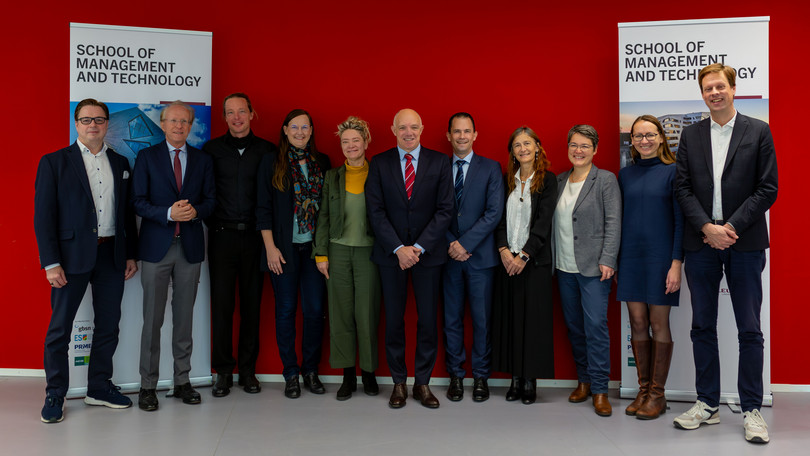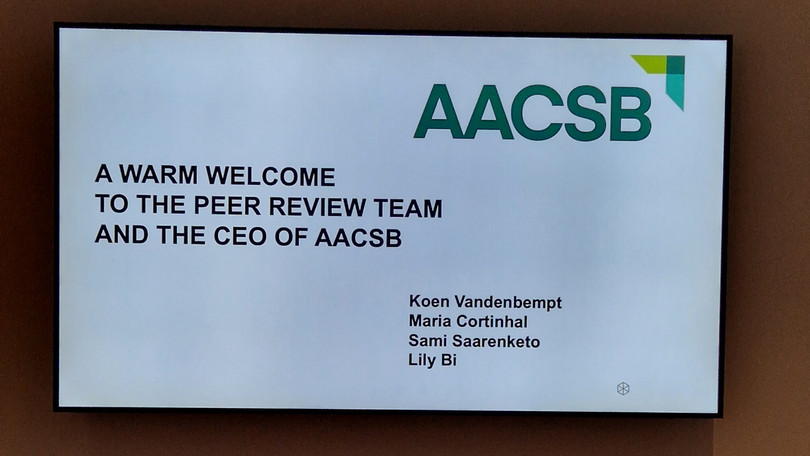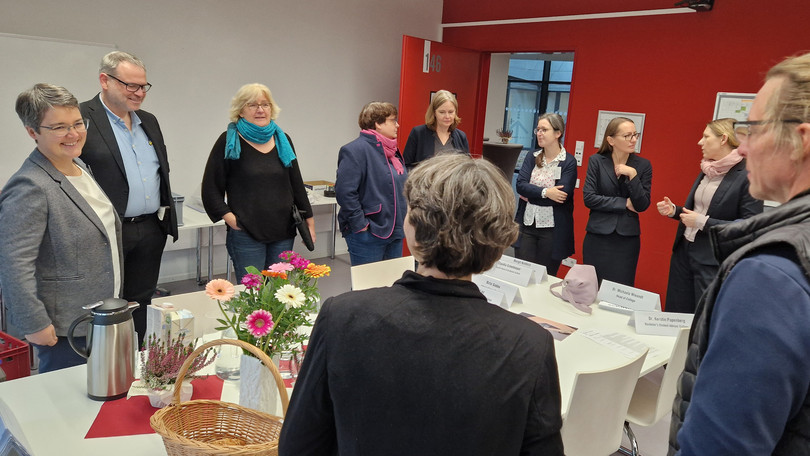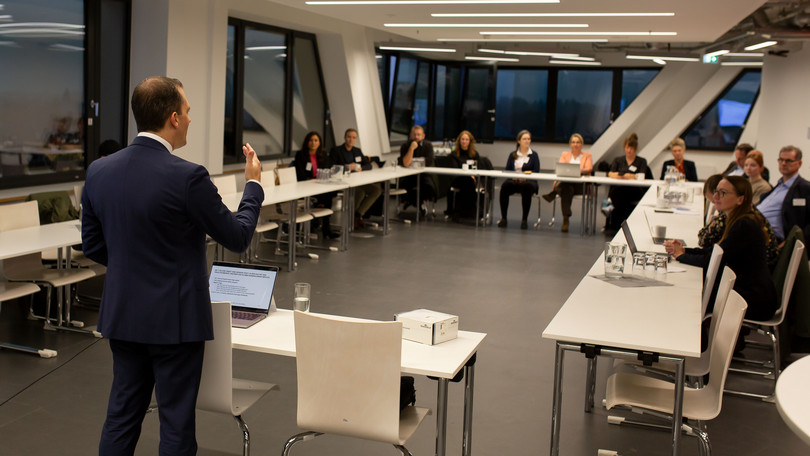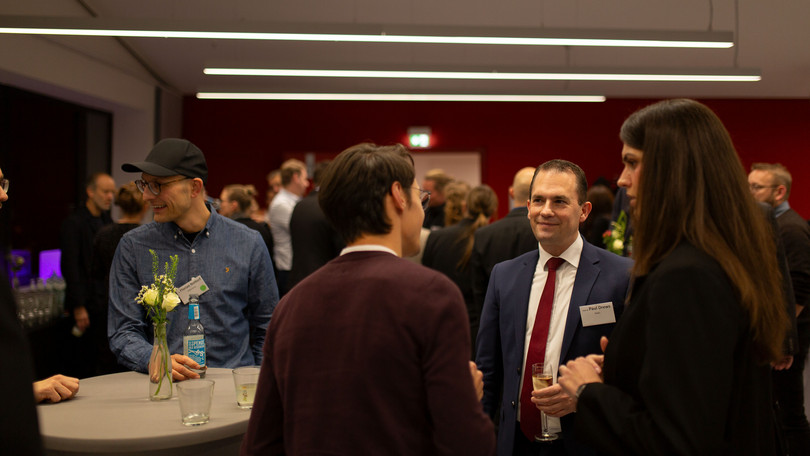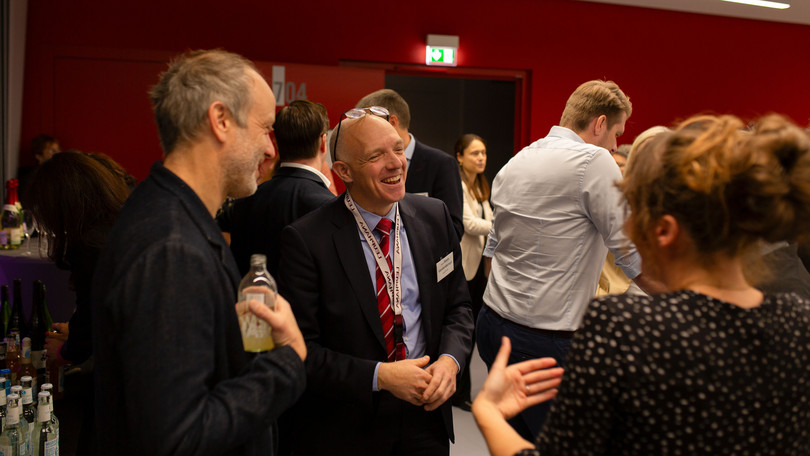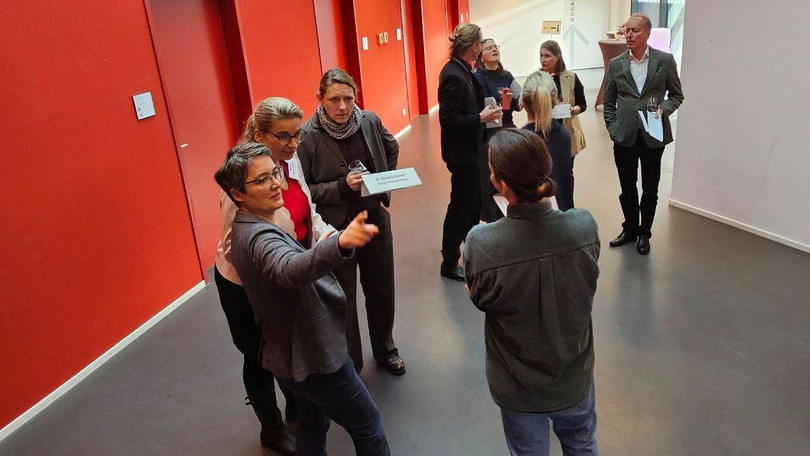AACSB: Leuphana School of Management and Technology receives international accreditation
2025-02-14 Lueneburg. After strategically realigning the School of Management and Technology (LSMT in short) and significantly developing its management, the members of the Leuphana School are now reaping the rewards: as of today, the School and its study programmes proudly bear the AACSB accreditation seal of quality.
The AACSB (Association to Advance Collegiate Schools of Business) is a network that has existed for over 100 years to test and certify the quality of education at business schools. This certification is one of the most prestigious awards for institutions of business education worldwide. With the AACSB seal, Leuphana School of Management and Technology (LSMT) is a pioneer. Only 16 other universities or schools in Germany obtain this seal of quality so far. In northern Germany, LSMT is the first public organisation to receive this distinction.
The members of LSMT are justifiably proud of this success, as only six per cent of all business schools worldwide are AACSB-certified institutions and meet international standards in teaching, research and administration.
‘TThis is a great achievement by all our colleagues in science and administration. The accreditation makes us even more attractive for prospective international students, partner universities and companies because it is easier to see what our strengths are and how systematically we conduct research and teaching’, says Leuphana President Sascha Spoun.
Paul Drews, Dean of the School, adds: ‘The accreditation provides us with independent external confirmation of the high quality of teaching and management at LSMT. It opens further doors for us for international cooperation.’
Ambitious development
The Leuphana School offers a unique combination of management and technology and thus an interesting portfolio of study programmes and research specialisations internationally. It fully exploits the combined potential of Business Administration, Business Information Systems, Engineering and Psychology in the workplace.
Elena Refec, the accreditation manager, describes the complex process: ‘The school has emerged stronger from the AACSB accreditation. We have further developed all processes, such as course planning, curriculum development and human resource management.’
Quality assurance for students
The quality management in teaching developed as part of the national accreditation was also updated with the so-called ‘Assurance of Learning’. Lotte Lutz, who is responsible for this, says: ‘At the LSMT, we strictly monitor the extent to which students actually complete their studies with all the skills and abilities that the programme offers. If we do not achieve certain goals, we react immediately.’
After all, compliance with the AACSB standards also confirms to students that they are being thoroughly prepared for the challenges of the global job market.
‘We now have proof that we consistently pursue our goals and continuously check whether we are on the right track or whether our goals are still right. This is an intensive but also promising process,’ summarises managing director Simon Burandt.
A connection for more responsibility
In terms of subject matter, the LSMT provides the framework for strong interdisciplinary research and teaching: ‘By working across disciplines on topics such as digital transformation, entrepreneurship, organisation Studies, responsible management, product development processes and psychology in the world of work, we are contributing to a better understanding of relevant social transformation processes,’ adds dean Drews.
Impact is also a focus of the accreditation and LSMT's strategy. ‘We measure the extent to which our projects in teaching, research and transfer influence industry or society,’ says Matthias Wenzel.
In addition to academic and economic impact, the Lueneburg school aims to contribute to social change and thus create ‘societal impact’. To this end, it supports, among other things, the founding of social and sustainable companies.
At the end of 2024, the school awarded ‘impact’ prizes to its researchers for the first time, including, for example, a workshop programme that led to the founding of companies in third countries and an international collaboration between researchers initiated by a professor of LSMT that advocated for the new European supply chain directive.
Pic 1: Relaxed atmosphere at the AACSB on-site visit at Leuphana in November 2024 (from left to right): Sami Saarenketo (LUT Business School, AACSB Peer Review Team). Leuphana President Sascha Spoun, Simon Burandt (Executive Director of the Leuphana Faculty of Management and Technology, or LSMT for short), vice dean Laura Venz (LSMT), dean of studies Brit-Maren Block (LSMT), Koen Vandenbempt (Antwerp University, Chair of the PRT ), Dean of the LSMT Paul Drews, Maria Cortinhal (ISCTE Business School, University Institute of Lisbon, PRT ), Lotte Lutz (LSMT science management), Elena Refec (AACSB coordinator) and Leuphana Vice-Chancellor Christian Brei.
Pic 2: The AACSB Peer Review team was welcomed with a personal message on the large monitor in the Libeskind building. Photo: LSMT
Pic 3:The campus tour and the meetings with all members of the Leuphana School of Management and Technology took three days. During the breaks, everyone met in the preparation room. Photo: LSMT
Further information
What makes the Leuphana School of Management and Technology (LSMT) stand out?
The current School of Management and Technology at Leuphana University Lueneburg emerged in 2022 from the Faculty of Economics and Business Administration, which was founded in 2010. In February 2025, it received the AACSB quality seal, which confirms its compliance with the highest international standards in teaching, organisation and research management.
As part of Leuphana, the LSMT forms a dynamic and innovative community of teachers, researchers and students with a high level of expertise in the areas of organisation, entrepreneurship, responsible management, sustainable product development processes, digital transformation and data science, as well as psychology. Learners, companies, organisations and associations benefit equally from the expertise and mutual relationships. The school's strategy is based on transdisciplinary cooperation with the aim of promoting innovation, change and responsible action in the Lueneburg region, Germany, Europe and beyond.
In this way, the LSMT creates impact embedded in the Hamburg metropolitan region, where research demonstrably stimulates long-term change in practice and society and inspires sustainable development.
To this end, the LSMT creates outstanding conditions in teaching and research, including strong collaborations with renowned research centres such as the Helmholtz-Zentrum Hereon. It is also a partner in major international networks and collaborations.
The university has signed the UN Principles for Responsible Management Education (PRiME) and the LSMT is a member of the renowned Global Business School Network (GBSN) and the European University Network on Entrepreneurship (ESU).
Contact
Press requests
School of Management und Technology
Leuphana University Lueneburg
Dean's Office of the Faculty of MT
dekanat.mt@leuphana.de
Pic 1: On the evening of the first day, external partners of the LSMT met for an advisory board meeting. Paul Drews provided information about progress and opportunities for collaboration. Photo: Leuphana
Pic 2: The first day of the inspection ended with a reception hosted by the Leuphana School of Management and Technology in the Libeskind Building. Photo: Leuphana
Pic 3: Dean Paul Drews (centre) in animated conversation with the School’s external partners: Photo: Leuphana
Pic 4: Koen Vandenbempt, chair of the AACSB Peer Review Team, is enthusiastic about the information he received at the evening reception about the Lueneburg region and the influence of Leuphana. Photo: Leuphana
Pic 5: Between sessions, the faculty meet again and again for short discussions. Photo: LSMT

